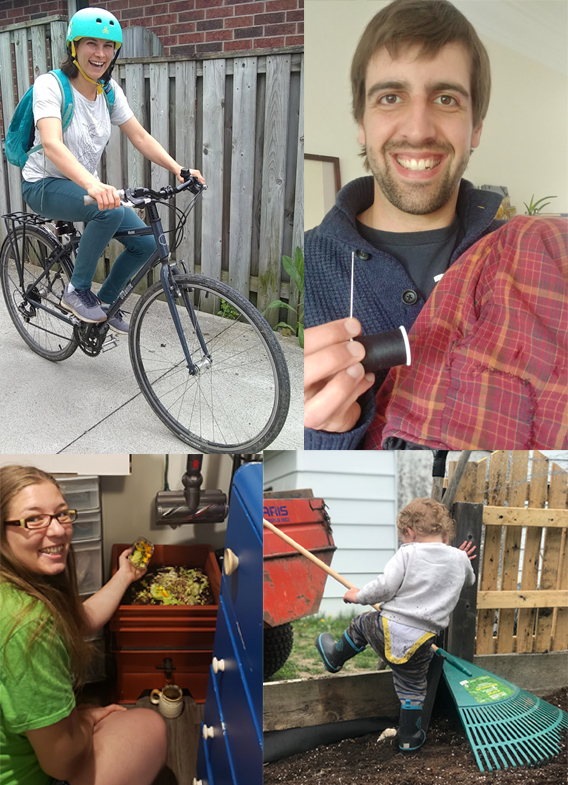
Written by: Jessica Middleton, Windsor Workshop Facilitator
One of my favourite parts of delivering Relay workshops is when I ask kids, “what are some ways you can conserve energy at home?”A wave of hands instantly goes up! From, “don’t stand with the refrigerator door open so much” to “I tell my parents to get a hybrid car.” The answers vary considerably, but the enthusiasm is top-notch.
Kids understand that actions have consequences, and they want to have a positive impact on the planet. I wanted to see what kind of reaction I would get from adults, so last week I reached out to my colleagues at Relay and asked, “What are some ways you reduce your ecological footprint in your everyday life?”
I was not disappointed.
Here are some inspiring stories I got in return:
Andrew, Green Careers Officer
I am reducing my eco-footprint by mending my clothes with a needle and thread. There is a lot of production that goes into making fabric and clothing, and a lot of waste produced when these items are thrown in the garbage. By stitching up rips and holes, I am able to extend the life of that garment and give it a little personality too!
Wesley, Executive Director
I try to avoid plastic food packaging as much as possible. We use our own bags for produce at the grocery store, and get our spices, peanut butter and snacks from the Bulk Barn using our own containers. Stores like Unboxed Market in Toronto are great for getting items like olive oil, tofu, eggs, milk and laundry detergent using your own containers as well.
*Disclaimer: Due to current COVID-19 restrictions, some stores are temporarily not accepting reusable containers.
Amanda, Indigenous Programs Manager
Now that the weather is getting better, one of our favourite things to do is spend lots of time getting back to our “roots” through gardening. My son Odin-Hawk loves raking and digging, while I have tried my hand with my green thumb. We have planted heritage tomatoes, zucchini, pumpkin, kale, squash and onions. We can’t wait to watch our plants grow!
Abasi, Youth Programs Manager
My favourite personal eco-action is properly disposing of compost. We live in a high-rise apartment, so at first there were challenges. My 5 year old son talked us into composting properly, and we have been doing it ever since! It’s amazing seeing how much food we keep out of the landfill by doing this.
Gemma, Southwestern Ontario Program Coordinator
We have a Worm Compost! This is really helpful for composting some of our extra produce waste as our building does not have a composting system. You have to be careful though because worms cannot eat everything. They breath through their skin, so any produce that is highly acidic or fatty will cause them to die. But with a little bit of knowledge, this system is a wonderful system for a small household. It is also great because after a few years, there is a rich and fertilized soil that we can put on our gardens.
Jessica, Windsor Workshop Facilitator
Something I do almost every day is ride my bike. I live in an area that has lots of trails and bike lanes, and that is relatively flat (Essex County is on an old lake bed). From running errands, to commuting to work, to exploring natural areas, my bike takes me everywhere I need to go within a 15 km radius! By riding my bike, I not only reduce my carbon footprint significantly, but I also connect more closely with my surroundings and get some much needed exercise.
Every-day actions matter.
While the solution to a sustainable future also requires collective action, change begins with us as individuals. The choices we make about how we use our resources, where we get our food, what we do with our waste, how we get around and more, add up for both our eco-footprint and the bigger picture. By practicing every-day eco-actions, we expand our understanding of how everything is connected, develop our skills for doing things better, and set examples for others to follow. Every day, we have the opportunity to reduce our eco-footprint and support a healthier, happier planet.
What do you do to reduce your eco-footprint in your every-day life, and what can you do to make it even lighter? Calculate your eco-footprint using this handy tool from The Global Footprint Network https://www.footprintnetwork.org/resources/footprint-calculator/

